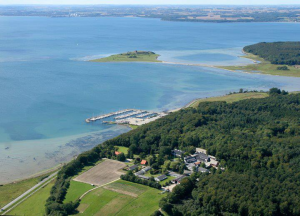
Denmark is lucky to have a unique learning environment for adults in its folk high schools. This is very difficult to describe to foreigners. Essentially they are boarding schools for adults, where students mostly go of their own volition out of an interest for the subject as well as the desire to learn and live intensively in a group that becomes very tight-knit over the course period.
This intense experience has been recognised as an ideal way for refugees to learn Danish especially when their stay in the folk high school happens in conjunction with that of native Danes. The Danish government have therefore in the past been willing to pay for a 6 month stay as a stepping stone to better Danish skills but especially to gain an insight into the Danish way of doing things, ie the cultural side. I can vouch for this having volunteered at one of my local højskole to help the students with their Danish homework. One of the students I help will be the only refugee on the small island where he has been allocated a flat and I do wonder how he will fare when his course finishes in June.
At the time I attended the conference, Global conflicts – local challenges, New citizens, training and workplace integration, in Odense on May 12th, the government was proposing to abolish this funding. It is likely though that they will be persuaded to retain it for the reasons mentioned in an earlier post, namely that you cannot learn a language effectively at work, which is the government’s preferred route to integration.
Workers or citizens?
Lisbeth Trinskjær, herself head of Ubberup Højskole, asked the question whether we wanted workers or citizens? The højskole experience creates citizens, whereas the straight into work option creates only workers. Employers demand a certain level of Danish and won’t offer jobs without this basic level but they will also often talk about the minimum needed to do the job, whereas being an active citizen demands more than the workplace minimum.
The importance of networking in a gig economy
And the most difficult aspect of becoming a citizen rather than a mere worker is that of being able to effortlessly network with your Danish neighbours. Even in the Danish labour market, networking is an important channel for getting a job and this points again to a need for a more than minimum skill in Danish.
As we all move from an employment economy to a gig economy, this networking aspect becomes even more important to being able to support yourself through short-term assignments. The højskole environment also pushes Danes out of their usual hands-off approach to dealing with strangers. So there was a call to action from Trinskjær for native Danes to be more pro-active in making contact.
One of the aims must be to see the refugees as something other than just refugees. They must have other roles in society. And in Denmark there is huge scope to play out other roles since clubs and organisations are very important in local civic life.
A narrow focus on the workplace is not enough. That’s why the unique højskole experience has such value.